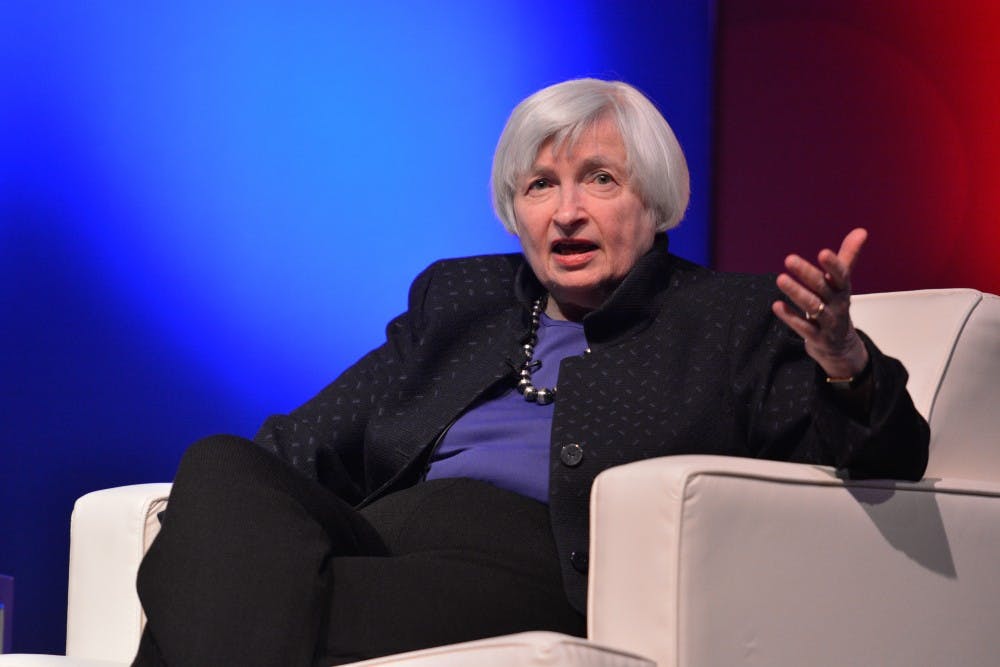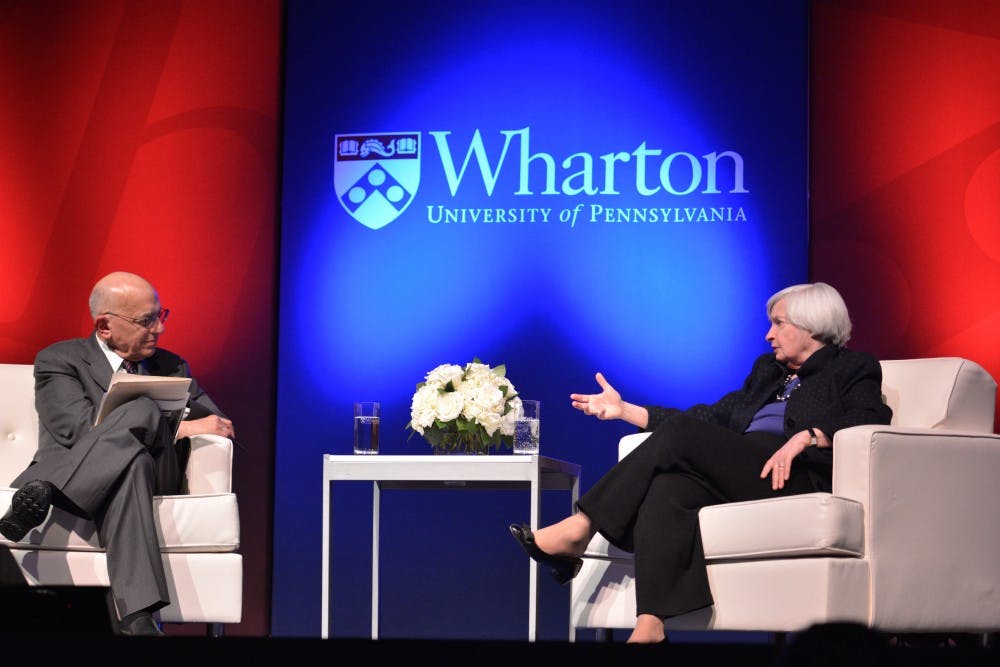
Janet Yellen, who served as the chair of the Federal Reserve System from February 2014 to February 2018, discussed her tenure and education at the Annenberg Center’s Zellerbach Theatre on Monday. Her talk with Finance professor Jeremy Siegel drew nearly 1,000 attendees.
Yellen, who announced her resignation in November 2017, largely expressed fondness for her time in the role, but also noted a few drawbacks to working in such a high-profile position — specifically the required 24/7 security detail.
The hour-and-a-half conversation opened with an introduction from the Vice Dean and Director of Wharton Undergraduate Division Lori Rosenkopf and mainly consisted of Yellen answering questions posed either by Siegel or the attendees.
Each time she was asked a question, Yellen broke down her answers into measured and clear ideas — a talent for which she's been lauded in the past and which appeared to draw upon her experience as an educator.
Siegel's first question concerned her experiences since stepping down as the chair of the Fed.
“In some ways it’s a relief to have a bit more independence,” she said. “It’s a wonderful group of people involved in protecting the Fed chair, but it also has a bit of a feeling of being in jail — with lovely jailers nevertheless.”
Siegel then launched a discussion into Yellen's introduction to the field.
Yellen described how she discovered economics as a freshman at Brown University in the 1960s, saying it was "love at first sight."
“Here was a subject that let me use my analytical skills … to contemplate questions that are of first-order importance to society,” she said. “I loved that combination.”

She discussed her transition from Brown to Yale University, from which she eventually received her doctorate in economics in 1971. Yellen briefly mentioned her time in academia when she worked as a faculty member at various institutions including Harvard University, the London School of Economics, and the University of California, Berkeley for several years.
Her discussion, however, focused largely on her subsequent experiences as the Fed chair after her appointment by former President Barack Obama in October 2014.
During the conversation, Yellen highlighted the fact that the United States' unemployment rate decreased from 6.7 percent to 4.1 percent over the course of her tenure. She also noted that the Federal Reserve struggled to meet a target level of 2 percent inflation during her time there, and she believes the current board of governors is still pursuing the same goal.
Yellen also commented on her successor Jerome Powell, who was appointed by President Donald Trump, expressing optimism about his unique viewpoint and noting his background in finance.
Powell is a former lawyer and investment banker who has served on the Fed's Board of Governors since 2012. Fed chairs have typically held doctorates in economics, which Powell does not.
Charles-Andre Guenette, an MBA candidate at the French business school INSEAD currently on an exchange program with the Wharton School, indicated that he is hopeful about the economy under Powell given Yellen's optimism, especially considering the differences between the two chairs.
Since leaving the Fed, Yellen has begun working for the Brookings Institution, an American research group and public policy think tank based in Washington D.C. Penn’s Think Tanks and Civil Societies Program, which compiles a widely-known annual index of think tanks, has listed Brookings as the “Top Think Tank in the World” every year since 2008.
Serving as a distinguished fellow in residence with the Brookings Economic Studies program, she plans to conduct research and use her experience to contribute to other projects. She also joins her predecessor Ben Bernanke, who served as Fed chair from 2006 to 2014, at Brookings.
Yellen, who was the first woman ever appointed to serve as Fed chair, also expressed hope for more female representation in economics despite some of the barriers that women currently face.
“When I look around the table at [international meetings of] financial ministers and bank governors there are precious few women,” she said. “This is also true in the private sector.”
She added that she feels that if more women were represented in economics and at higher levels, it would make a difference in the work that economists do.
Yellen also fielded a question from a student concerning whether central banks have begun to examine the burgeoning role of cryptocurrency in the global market.
She responded stating that the "general view" concerning cryptocurrency in central banking is to be "very cautious."
Several attendees expressed admiration for Yellen and her knowledge of the field.
Wharton sophomore Eliza Reinisch cited Yellen as an inspiration. “I've been obsessed with [Yellen] for a long time," Reinisch said.
Salma Ali, another INSEAD MBA candidate currently at Wharton, said she was impressed by Yellen’s delivery and felt pushed to consider economic concepts in new ways.
“I think she did such a good job simplifying [these concepts] in these two hours,” Ali said. “I don’t think you could do it better than that.”
Only one month into her new job, Yellen expressed enthusiasm about her new lower-stress environment. For now, she said she plans to advise researchers and conduct her own economics research at Brookings, and she hinted at a possible book in the near future.
The Daily Pennsylvanian is an independent, student-run newspaper. Please consider making a donation to support the coverage that shapes the University. Your generosity ensures a future of strong journalism at Penn.
Donate







